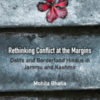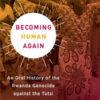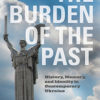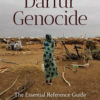Books

Rethinking Conflict at the Margins: Dalits and Borderland Hindus in Jammu and Kashmir
By Mohita Bhatia. This book departs from the conventional academic narration of the conflict situation in Jammu and Kashmir and expands the debate by shifting the focus from Kashmir to Jammu region. Generally, it is the response of Muslim-majority Kashmir region – particularly its contestation of the hegemonic and assimilative temperament of the Indian state…
Read more
What Remains: The Post-Holocaust Archive in German Memory Culture
By Dora Osborne. With the passing of those who witnessed National Socialism and the Holocaust, the archive matters as never before. However, the material that remains for the work of remembering and commemorating this period of history is determined by both the bureaucratic excesses of the Nazi regime and the attempt to eradicate its victims…
Read more
Becoming Human Again: An Oral History of the Rwanda Genocide against the Tutsi
By Donald E. Miller, Lorna Touryan Miller and Arpi Misha Miller. Genocide involves significant death and trauma. Yet the enormous scope of genocide comes into view when one looks at the factors that lead to mass killing, the struggle for survival during genocide, and the ways survivors reconstruct their lives after the violence ends. Over a one…
Read more
The Burden of the Past: History, Memory, and Identity in Contemporary Ukraine
Edited by Anne Wylegala and Malgorzata Glowacka-Grajper. In a century marked by totalitarian regimes, genocide, mass migrations, and shifting borders, the concept of memory in Eastern Europe is often synonymous with notions of trauma. In Ukraine, memory mechanisms were disrupted by political systems seeking to repress and control the past in order to form new…
Read more
Die fotografische Inszenierung des Verbrechens: Ein Album aus Auschwitz
By Stefan Hördler, Tal Bruttmann, and Christoph Kreutzmüller. This book offers the first critical analysis of photographs taken in the concentration camp of Auschwitz-Birkenau. The photographs, also known as the “Auschwitz-Album,” were discovered by Lili Jacob in the concentration camp Dora-Mittelbau in 1945. The photographs, taken by SS photographers Bernhard Walter and Ernst Hofmann, were…
Read more
The Holocaust and Masculinities: Critical Inquiries into the Presence and Absence of Men
Edited by Björn Krondorfer and Ovidiu Creangă. In recent decades, scholarship has turned to the role of gender in the Holocaust, but rarely has it critically investigated the experiences of men as gendered beings. Beyond the clear observation that most perpetrators of murder were male, men were also victims, survivors, bystanders, beneficiaries, accomplices, and enablers;…
Read more
Darfur Genocide: The Essential Reference Guide
Edited by Alexis Herr. Stretching beyond Darfur to situate Sudan within the scope of its African, colonial, human rights, and genocidal history, this reference work explores every aspect of the Darfur Genocide. Covering hundreds of years, this book explores the religious, ethnic, and cultural roots of Sudanese identity-making and how it influenced the shape of…
Read more
Memory Passages: Holocaust Memorials in the United States and Germany
By Natasha Goldman. For decades, artists and architects have struggled to relate to the Holocaust in visual form, resulting in memorials that feature a diversity of aesthetic strategies. In Memory Passages, Natasha Goldman analyzes both previously-overlooked and internationally-recognized Holocaust memorials in the United States and Germany from the postwar period to the present, drawing on many historical…
Read more
Phenomenal Justice: Violence and Morality in Argentina
By Eva van Roekel. How do victims and perpetrators of political violence caught up in a complicated legal battle experience justice on their own terms? Phenomenal Justice is a compelling ethnography about the reopened trials for crimes against humanity committed during the brutal military dictatorship that ruled Argentina between 1976 and 1983. Grounded in phenomenological anthropology and…
Read more
Imagining the Unimaginable: Speculative Fiction and the Holocaust
By Glyn Morgan. Imagining the Unimaginable examines popular fiction’s treatment of the Holocaust in the dystopian and alternate history genres of speculative fiction, analyzing the effectiveness of the genre’s major works as a lens through which to view the most prominent historical trauma of the 20th century. It surveys a range of British and American…
Read more
